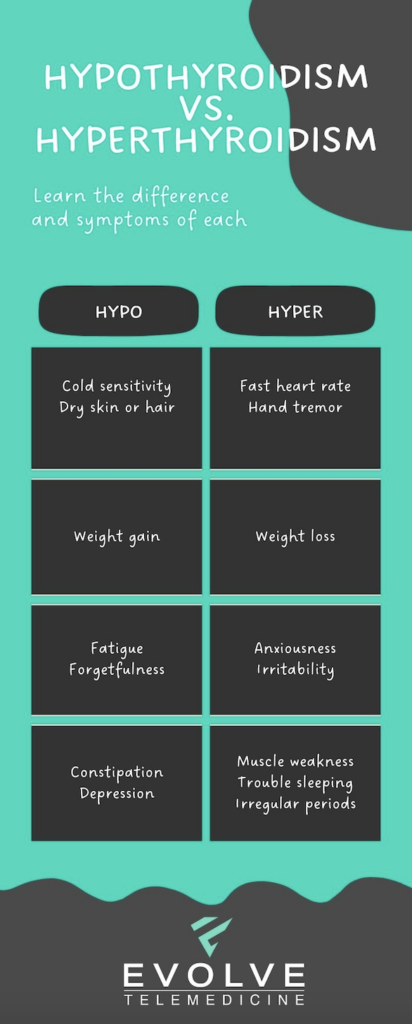The thyroid is a body part many people know so little about yet plays such a significant role in daily well-being. Both hypothyroidism and hyperthyroidism are conditions to pay attention to because too much or too little thyroid activity causes health issues.
Since the thyroid controls much of your metabolism, it’s important to monitor its function to ensure you’re achieving optimal health. Now, let’s talk more in detail.
What Is the Difference Between Hypothyroidism and Hyperthyroidism?
So, what’s the difference between the two?
Hypothyroidism is more common than hyperthyroidism in the United States, but both pose equally problematic health issues since the thyroid gland controls every aspect of your body’s metabolism. Symptoms between both thyroid conditions present polar opposite indicators.
Hyperthyroidism
Hyperthyroidism occurs when your body makes too much of the thyroid hormones, thyroxin (T4) and triiodothyronine (T3) which cause the thyroid to become overactive as a result. You may experience an increase in energy, weight loss, faster heart rate, or hand tremors. Many people also tend to feel anxious with this condition.
Hyperthyroidism symptoms
- Increased energy and restlessness: Individuals may experience a sudden boost in energy levels and may feel restless or jittery.
- Weight loss: Despite having an increased appetite, people with hyperthyroidism may lose weight.
- Faster heart rate: A rapid heart rate, also known as tachycardia, is a common symptom.
- Hand tremors: Shaking or trembling of the hands can occur.

Hypothyroidism
Hypothyroidism causes a slowed production of the gland’s hormones which leads to a slowed metabolism as well. Symptoms of low thyroid include slowed metabolism, weight gain, fatigue, sensitivity to colds, or feelings of depression. Having an underactive thyroid can seriously decrease or slow down your bodily functions.
Hypothyroidism symptoms
- Slowed metabolism: Individuals with hypothyroidism may notice weight gain or find it difficult to lose weight despite a healthy diet and exercise.
- Fatigue: A feeling of constant tiredness and lack of energy is common.
- Sensitivity to cold: People with hypothyroidism may feel colder than usual, even in normal temperatures.
- Feelings of depression: Hypothyroidism can affect mood and lead to feelings of sadness or depression.
Ways to Improve Your Thyroid Health
Are you experiencing unexplained symptoms and suspect that your thyroid might be the culprit? Thyroid health plays a crucial role in regulating various bodily functions, and an imbalance can lead to a range of issues.
Incorporate iodine and selenium-rich foods
Iodine and selenium are vital minerals for maintaining proper thyroid function. Including iodine-rich foods like seaweed, iodized salt, fish, and dairy products can support thyroid health. Similarly, selenium, found in nuts, seeds, and certain meats, aids in the conversion of thyroid hormones and reduces inflammation.
Focus on a balanced diet
Apart from iodine and selenium, a well-rounded diet is essential for overall thyroid health. Opt for a diet rich in fruits, vegetables, lean proteins, and whole grains. Avoid processed foods and excessive consumption of sugar and refined carbohydrates, as they can disrupt hormonal balance.
Regular exercise
Exercise has numerous benefits for thyroid health. It helps improve metabolism, reduces insulin resistance, and promotes hormonal balance. Aim for at least 30 minutes of moderate exercise most days of the week, such as brisk walking, cycling, or swimming.
Get sufficient sleep
Adequate sleep is crucial for overall health, including thyroid function. Aim for 7-9 hours of quality sleep each night to support hormonal balance and promote healing and repair.
Limit alcohol and avoid smoking
Excessive alcohol consumption can interfere with thyroid hormone production and lead to imbalances. Smoking, on the other hand, can increase the risk of thyroid disorders and worsen existing conditions. Minimize alcohol intake and avoid smoking to protect your thyroid health.
Final Thoughts
Testing your thyroid levels is highly recommended! Regularly test your thyroid levels at Evolve Telemedicine with a personalized blood panel. The thyroid-stimulating hormone (TSH) tells your thyroid how much of the gland’s hormone it needs to produce. TSH, T4, and T3 can all be tested and balanced with the help of experts at Evolve Telemedicine.
If you need extra support to balance your thyroid, natural treatment options such as naturally desiccated thyroid medication exist for certain thyroid conditions. Naturally desiccated thyroid medication is a thyroid hormone replacement drug used to treat hypothyroidism on an individual basis and can be prescribed by the team at Evolve Telemedicine.
Getting my hormone levels checked by Evolve was incredibly helpful and gave me insight into what was ACTUALLY going on with my health. As a young woman, it’s not always easy to get conventional doctors to listen to you; I was typically met with the ‘you’re too young to be experiencing that’ and ‘your levels are within range lines. That’s why I’m so happy I found Evolve… My care coordinator and physician really listen to me. For the first time, I felt heard about the health issues I was experiencing. Plus, I was given great solutions and valuable information about my health. Since starting on natural desiccated thyroid treatment, I’ve experienced increased energy, clearer skin, and better focus. Too many women go undiagnosed with thyroid issues, but I no longer have to worry about that thanks to Evolve!
Jillian W., Evolve Patient






